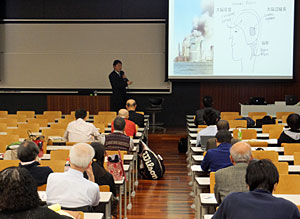SIT Faculty Delivers Two Major Addresses on Reconciliation Challenges in the Asia Pacific
July 14th, 2016 | SIT Graduate Institute

Diverse approaches to conflict reconciliation
In late November, Tatsushi Arai, associate professor of peacebuilding and conflict transformation at SIT Graduate Institute, traveled to Tokyo as a special guest and invited speaker at two events organized by Waseda University’s Organization for Regional and Inter-regional Studies (ORIS). Both events—the First International Symposium and the Sixth ORIS Seminar—explored diverse approaches to reconciliation and were attended by Japanese and international audiences.
The events were held against the backdrop of a range of deep-rooted historical conflicts and issues shaping Japanese policy and international relations in East Asia. These concerns include the East China Sea territorial dispute between Japan and China, the sustained and heightened tension between Japan and Korea over the historical role that the Japanese empire had played in the employment of Korean “comfort women,” and the delicate balance between the deepening US-Japanese security alliance and China’s growing influence in the Asia Pacific region.
During his keynote address at the seminar, which focused specifically on the Asia Pacific region, Tatsushi examined the roles of collective societal trauma in protracted historical conflict, also exploring concrete civil society initiatives and policy measures that promote reconciliation.
Tatsushi is a long-term peacebuilding practitioner and dialogue facilitator with particular expertise on the Taiwan Strait, Japan-China relations, and Myanmar. The invitation extended by Waseda University to Tatsushi reflects the university’s recognition of his scholarship—including his most recent publication, Contested Memories and Reconciliation Challenges: Japan and the Asia-Pacific on the 70th Anniversary of the End of World War II, co-edited with Shihoko Goto and Zheng Wang.
Tatsushi’s two addresses at Waseda University—as well as his lively exchange of views with Japanese and international scholars and diverse participants—explored what holistic, experiential methods of learning and applied practice are capable of accomplishing in support of participatory policymaking and civil society–led social change. These are views the School for International Training has consistently sought to advance over the years.
